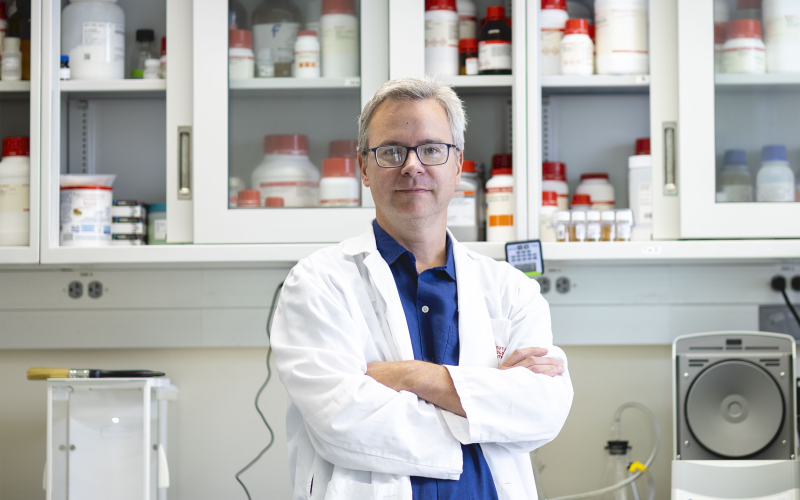UAlbany Scientist Awarded More Than $4 Million to Study Disease Progression in Mammalian Cells

ALBANY, N.Y. (July 9, 2024) — In the course of human development, from embryo to old age, few intracellular actors play as critical a role as protein tyrosine phosphatases (PTPs). Members of this “superfamily” of enzymes help control signal processing in cells. When functioning normally, PTPs regulate fundamental processes such as cell growth, differentiation and migration. When PTPs aren’t working properly, diseases such as cancer are able to spread unchecked.
Now, UAlbany Associate Professor of Nanobioscience Ben Boivin from the Department of Nanoscale Science and Engineering has been awarded more than $4 million in grants from the National Institutes of Health (NIH) to further explore the role of PTPs in disease progression.
Boivin has been awarded a 4-year, $2,189,521 grant from NIH’s National Heart Lung and Blood Institute to examine the “Role of Protein Tyrosine Phosphatase 1B in Cardiac Hypertrophy.” Boivin has also been awarded a 5-year, $ 1,878,765 grant from NIH’s National Institute of General Medical Sciences for his project, “Complexity of Protein Tyrosine Phosphatase Oxidation.”
A protein biochemist by trade, Boivin sees PTPs as an untapped resource. While studying the role of proteins in cell signaling has a long history in terms of cancer and cardiovascular research, Boivin is particularly interested in PTPs for their role in inhibiting signals.
“Cells have evolved complex ways to respond to their environment, so if you want to inhibit a signal within the cell, you need to understand how the signal is sent within that cell and find ways to turn off these signals that are being sent to the nucleus,” said Boivin. “PTPs are a family of proteins that act as brakes on these signals.”
Similar to a car, a human cell has numerous pieces that must work together to function properly. For instance, if you step on the gas and the brakes at the same time, the car will not move forward. This is basically what happens when cells respond to their environment: The cue activates the gas and temporarily turns off the brakes, by oxidizing them.
In several diseases, this oxidation is excessive and the brakes stay off too long.
“We found how cells take that oxidation signal and transfer it to the brakes. If we can prevent the oxidation transfer, we can stop the brake from being turned off,” said Boivin. “It’s a way of reestablishing, or tuning down the signal that is being sent to the nucleus.”
While scientists have understood how turning off the brakes provides the conditions for disease to progress, most therapies rely on drugs that prevents the “on” signal to the nucleus, inhibiting protein kinases, but cells adapt to these drugs.
“We are tackling a way to turn on the brakes, and nobody has ever done that. We know how they are turned off, if we can figure out how can we turn them back on, we see a high potential for developing better forms of therapies to fight disease,” said Boivin.
“The molecular engineering work that Dr. Boivin is pursuing is a key example of how the engineering design process can be combined with cellular biology and biochemistry to create new molecules with a specific job – in this case to control processes that allow unchecked cellular growth found in tumors and cardiac hypertrophy,” said College of Nanotechnology, Science, and Engineering Dean Michele J. Grimm. “The potential impact of this work has been recognized by Dr. Boivin’s peers who reviewed his proposals and the NIH in making the funding decision. We are proud of Dr. Boivin and excited about the possibility of his research having a game-changing effect on treating and preventing human disease.”
“Dr. Boivin is a leader in cellular signal transduction research,” said Department of Nanoscale Science and Engineering Professor and Chair J. Andres Melendez. “His groundbreaking research has identified novel molecular triggers that underlie cardiac disease and cancer, which are the leading causes of death in the United States. These federal awards will enable the Boivin Lab to discover innovative therapeutic approaches for combating these devastating diseases and to mentor the next generation of research scientists.”
Boivin’s research will focus on three specific areas:
- Identifying the enzyme that transfers oxidants onto PTPs and then designing molecules or peptides that interact at the interface to prevent oxidation. The goal is to reestablish normal signaling in cancer cells by introducing a way to prevent brakes from being turned off.
- Identifying where, how and why cholesterol binds to PTP and then designing screens — to design a small molecule/drug that binds to the same pocket and can turn the brakes back on — to re-establish physiological the signaling.
- Finally, Boivin’s lab will identify how the prolonged oxidation of PTP1B contributes to cardiac hypertrophy and apply his new molecular tools to activate the phosphatase in animals.
“PTPs are an untapped resource, and understanding the complexity of their catalytic regulation by redox mechanisms will generate knowledge and resources with high potential for translation into therapeutic modalities,” said Boivin.




